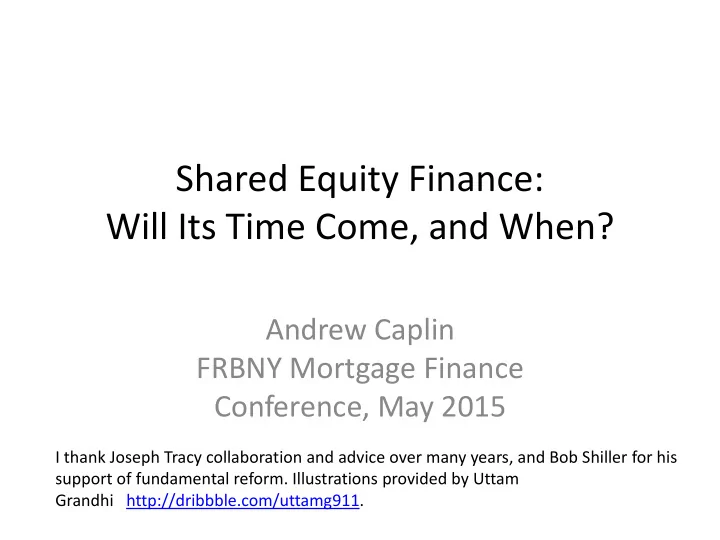

Shared Equity Finance: Will Its Time Come, and When? Andrew Caplin FRBNY Mortgage Finance Conference, May 2015 I thank Joseph Tracy collaboration and advice over many years, and Bob Shiller for his support of fundamental reform. Illustrations provided by Uttam Grandhi http://dribbble.com/uttamg911.
Introduction • Rationale for Shared Equity • Why It Hasn’t Happened • Why it (Likely) Will Happen • Why I (Likely) Will Not Get Satisfaction
Introduction • “A method of housing finance in which an unrelated third party puts up money against a property that is in most senses “owner - occupied”. Caplin [2010]
Introduction • Best known is SAM • $200,000 home with $20,000 down payment – Not $180,000 but $140,000 conventional mortgage – $40,000 covered by a SAM. • Pay back 50% (say) of XS over $200K of final arms’ length sale of the home. • Pure equity share: investor accepts 50% of losses also
Rationale • “In their 1997 book Caplin, Chan, Freeman, and Tracy outlined at length the massive gains from trade that assets of this form could liberate. In large part, these result from loosening the ‘all or nothing’ constraint on home ownership. The sub-title of the book was “Why the second half of your home may be the worst investment you ever make”, and it has been proven true with a vengeance in the recent period .” Caplin [2010]
Rationale • The risk of homeownership should be diversified • Lowers chance of borrowers being “under water” when home prices fall • No interest on the loan during its term. • Caplin, Carr, Pollock, and Tong [2007] present survey evidence of high potential interest, particularly among renters with young children.
Rationale • From a capital markets perspective funded through “home equity-backed securities”. • Investor participation would improve incentives throughout the supply chain. • Political economy: William Fischel and Lee Anne Fennell argue would reduce “ NIMBYism ”
Why It Hasn’t Happened • Caplin, Cunningham and Engler [2009]show that tax rules make it essentially impossible to develop SAM markets in the United States. • Since 1983, Treasury has placed SAMs on the “no - rulings” list.
Why It Hasn’t Happened • The crash has changed nothing – Yet equity sharing would have prevented the crisis from becoming as deep as it did. – Also Caplin, Cunningham, Engler, and Pollock [2008] and Caplin and Cooley [2009] show use in alleviation ex post
Why It Hasn’t Happened • Caplin and Lowrance [2014] analyze failure in “The Mortgage Mess, the Press, and the Politics of Inattention” • Game with Four Players – Scientific experts – Press – Public – Politicians
Why It Hasn’t Happened Press Public Policy Makers Scientific Experts
Why It Hasn’t Happened • Ideal response to bad event: – Scientific experts: • review events • develop reform proposals – Press communicates proposals – Public pressures for reform – Politicians undertake reform – Applies whatever the source of information
Why It Hasn’t Happened • Replace ideals with people • Housing finance ideological – Pre-written editorials and tweets – No real light shed • Experts retreat to ivory tower – Safe harbor
Why It Hasn’t Happened
Why It Will Happen • FHA issuing high LTV loans: Risk Assessments exemplars of inattention and inertia • Aragon, Caplin, and Tracy [2010] and Caplin, Cororaton, and Tracy [2012] identified biases and lack of access – Main bias “ streamline refinances” treated as if successful exit like selling home • Same forces in play so heading us to same place • Repetition will ultimately trigger reform and equity sharing
Reform in My Lifetime? • Wild guess: 20% chance next crash within 10 years – Then 50% chance real reform and equity sharing • Else real reform more than 40 years away • Keynes more likely than not literally correct
Recommend
More recommend